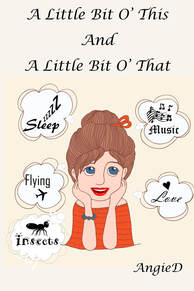|
Selfishgenie Publishing are pleased to hand over our blog this week to one of our poets, AngieD, who is writing about how she became a poet and how she is inspired to write her poetry. Disclaimer: All views expressed in this blog are those of the author and aren't necessarily those of Selfishgenie Publishing  Poet AngieD Poet AngieD I’d like to say that writing poetry was something I was good at in school, though in between Romeo and Juliet, Hard Times et al, there didn’t appear to be much time devoted to this category of English Literature; what little poetry we children were exposed to I could barely understand since, to my mind, it was in adult language and highly cryptic; too cryptic for my little ears. I therefore had very little knowledge of what poetry was about, except for limericks and nursery rhymes. And so, if I said it was something I’ve always wanted to do and that each time I read a ditty it had me thinking “Gosh! I wish I could write a verse” and piqued any great interest, I would be lying! It wasn’t something that ignited any spark of excitement or great interest at all, quite different from hearing someone with extraordinary musical abilities, which aroused feelings more of jealousy that I couldn’t, and probably would never, play like that.  I didn't get excited about poetry. I didn't get excited about poetry. So, besides reading limericks and silly nursery rhymes, I didn’t really give poetry much thought. In fact, the first I really knew about any ability to write a verse was quite a few years ago, lying in bed one weekend morning in my very small and humble-in-great-need-of-decoration second floor London flat and being disturbed by the neighbours occupying the one below. They were making an awful racket but, instead of getting highly irritated (well, not strictly true – I was a little irritated at first!) my mind just seemed to speak in rhyme. It was quite a startling and frightening revelation to me.  Gracula religiosa intermedia (Common Hill Myna) Gracula religiosa intermedia (Common Hill Myna) At first I heard myself say “who’s that talking?” not realising it was my mind. Nevertheless, I went with the flow, chuckling as I wrote down the words of this verse about a Myna bird. I had never had an encounter with one; I’d never even seen one. I even had to look it up. What connection had this with the noise I was hearing? I have no clue, but my first ever verse was written and, being a PA Secretary (and previously in the “be prepared” Girl Guides and Girls’ Brigade), I always had pen and paper by my bedside. And that was the start!  From then on it was, as they say, all systems go, like a dam had burst and that part of my mind which had laid dormant had suddenly woken up, its contents released, and there was now no turning back. Things I’d never noticed before would quickly come into my mind’s eye and words or lines would pop up. Voices would say “hurry up there’s another waiting to be written down”. It could be frantic at times since I couldn’t write quickly enough to get everything down! Now, was this the reason I learned shorthand?* Even if it wasn’t, it was now coming to the fore, since it enabled me to write at breakneck speed. This doesn’t bode well for wrists and hands since even before I arrived to start a day’s work, I was already weary from an hour or more of writing while on my train journey.  The lightbulb of inspiration. The lightbulb of inspiration. I found nothing in particular inspired me. In fact, everything inspired me. Finding a window seat on the train was my most important early morning mission so I could write while observing the scenery and how it changed from morning to morning. It was beautiful. How had I never noticed this before? So much to see and appreciate; now that was exciting! Scenery, people and animals were looked at in a different light. Do you ever notice the habits of people: feet on seats where others have to sit. Leaving their rubbish on seats and floor. Grownups picking their noses, biting their nails, coughing or sneezing without covering their mouths, speaking so loudly one can hear every word (and me itching to join in!). That annoying clicking on laptops or ‘phones as they type away as if the train is their office! My mind would just rhyme away; I could have sat on the train all day just writing.  Inspiration can come from anywhere. Inspiration can come from anywhere. I’m finding writing poetry is a 24/7 thing. Everything I look at, see, or hear becomes a subject. Although I have written now for quite a few years, I have only recently succumbed and accepted the fact that writing is a part of me. It happens anywhere at any time, in any place (church, supermarkets, the aforementioned trains), I’m not really conscious of it happening, it just happens; commuting on my way to work when I had to commute; walking from the railway station to the office; in a restaurant (and often I would be asked if I was a reporter!). Whatever popped up in my mind would have to be written down. I find writing takes no prisoners if it’s in your mind it has to exit somewhere and if one doesn’t comply pretty sharpish, it fades away and is forgotten. Work produced ample opportunities to write fun little personal verses. If a colleague was having a bad day, I could write something to make them smile. Business acquaintances too would engage and respond to my verse, in verse. Which made work all the more fun and, sometimes, they would even apologise for not replying in the same vein!  Everything seemed now to be about writing verses, not just writing a memo in prose, but some notification of meetings or cancellations were rhyme written and, again, replies would come back in verse! See, everyone can rhyme! Earlier years would see me go to bed with a pencil and notebook and practically never sleep! I am learning to control it a little more than in past years. I won’t say I’m completely successful, that would be impossible. If that which is filling my mind is not written down then it is lost forever. This has been tested; I’ve had a verse(s) in my mind and thought that chanting it over and over during the night would ensure it would be remembered in the morning. Not so, I couldn’t even remember the subject, so that much I’ve learned. Even though I now leave the pencil and paper on a cabinet three steps away from the bed, verses still often, come in the middle of night and I have to write them down but, thankfully, it’s much easier doing it via the recording app on my phone!  The queue of ideas is never ending The queue of ideas is never ending At times it feels like a tap that never switches off. Each new day brings a different set of subjects and so the writing continues, and you tend to become at one with whatever you’re writing about. It never occurred to me that I would be writing for so many years. Did I ever think I’d write so many? No. I thought one day I’d run out of things to write about, maybe about the 50th verse and that one day the verses will dry up. Touch wood, thousands of verses later it hasn’t happened yet. I am aware of the saying all good things come to an end, but my end has not yet come! Do I get tired of writing? Well actually, physically, yes I do. It’s a never-ending task to which most poets and authors of books can probably attest. There is always an idea in your head and before you can write it down another one is waiting in the wings eager to be noted. The unavoidable task of writing is logging all that is written!  The one about the loo rolls! The one about the loo rolls! I write to empty my mind of words to make room for the words I can see pushing past those I’m writing, so I think so there’s no time to enjoy. I do often sit while watching TV reading some of the verses and often wonder what the blazes was I thinking to write that (like the one about loo rolls!). But what I enjoy most and the best reason to write is seeing those who hear my readings, and knowing those who read my book smile and/or comment that they can relate to whatever they’ve heard, whether it’s romance or why toenails grow much faster than fingernails. I’ve said it before and I’ll say it again, if it makes people smile or gives food for thought then it’s been worth writing!  Poetry seems to be within me for the foreseeable future, so I have (happily) learned to live with it and the constant buying and sharpening of pencils!. Poetry is my world along with music, spinach, dancing and cheese. To find out more about AngieD’s poetry, see her collections on our “Books” page. Two more volumes are scheduled for publication during Spring 2024. * For younger readers, shorthand was a system of speed writing. The modern versions can be traced to 1720, but it is known to have existed as far back as the 4th century BC. It is a way of writing that allowed secretaries, journalists etc to record the spoken word at the same pace as it was uttered, without missing any of it. Modern technology has rendered it obsolete. To find out more about AngieD’s poetry collections, click here. If you have enjoyed this blog, or found it informative, then make sure you don’t miss future editions. Just click on the button below to sign up for our newsletter. We’ll even send you a free ebook for doing so.
0 Comments
|
AuthorThis blog is compiled and curated by the Selfishgenie publishing team. Archives
June 2025
|
 RSS Feed
RSS Feed